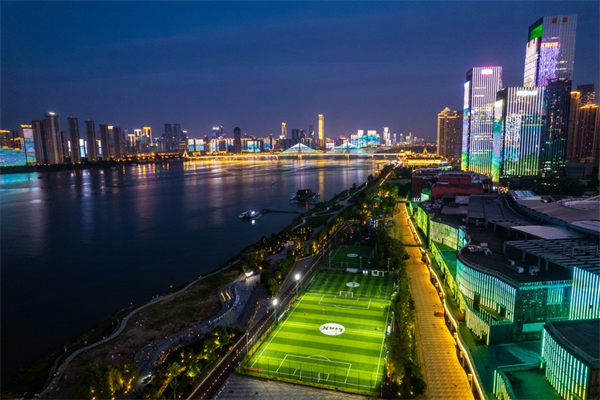
This aerial photo taken on June 7, 2023 shows a riverside football field in Changsha, central China's Hunan Province. (Xinhua/Chen Sihan)
CHANGSHA, June 19 (Xinhua) -- Boukete Grace, a 29-year-old Congolese student at Hunan Normal University, is a regular at a coffee shop in Changsha, capital of central China's Hunan Province, going there three to four times a week to enjoy his discounted cup of African coffee.
African customers are entitled to the special treat in the shop owner's tribute to the direct purchase of coffee beans from African farmers, who benefited from the city's pioneering role in boosting economic and trade cooperation between China and Africa.
"Relying on the trade tie, we can directly purchase from African coffee farmers without sourcing through intermediaries, which not only reduces my costs, but also helps African farmers increase income," said Jing Jianhua, who founded the Hunan Xiaokazhu Coffee Co., Ltd. in 2021.
The company, running the cafe chain brand "Own Master," recently raised 100 million yuan (about 14 million U.S. dollars) through its A-round of financing.
Grace spends 8 yuan for the cup of African coffee priced at 25 yuan at the coffee chain store in Changsha.
As the permanent host of the China-Africa Economic and Trade Expo, the city of Changsha is going to host the third China-Africa Economic and Trade Expo from June 29 to July 2 this year, which is expected to further advance high-quality economic and trade cooperation between the two sides.
So far, 53 African countries, eight international organizations, and over 1,500 centrally-administered state-owned enterprises, business associations, and financial institutions have applied to attend the biennial event.
Grace looks forward to introducing his African compatriots attracted by the expo to "Own Master" shops to enjoy authentic African coffee at preferential prices.
Living in Changsha, he has learned that the city's ties with Africa can be traced back to over 1,000 years ago, when porcelain wares made in an ancient kiln there were exported to Africa through the Maritime Silk Road.
ANCIENT PORCELAIN CAPITAL
A stash of 1,200-year-old Chinese treasure found under the sea in Indonesia has been returned to Changsha. The 162 pieces of treasure were part of a huge cargo of ninth-century porcelain traded from China during the Tang Dynasty (618-907) via an Arab dhow, which wrecked in Indonesia's Java Sea.
In 1998, a German salvage company discovered the shipwreck and named it "Batu Hitam." More than 67,000 pieces of treasure were found in the ship, 85 percent of which came from a kiln in Changsha.
Qu Wei, director of the Tongguan Kiln Museum in Changsha, said that the kiln was a center of a porcelain-making cluster in the Tang Dynasty, which produced artifacts that have been found to have reached about 30 countries and regions, as far away as northern Africa.
Many made-in-Changsha porcelain relics carry designs and patterns that were ordered by foreign customers, such as paintings of "foreign women figures" and tropical plants like "palm trees."
"The porcelain wares from the Changsha kiln were 'high-end customized' products from over 1,000 years ago," said the curator Qu.
Changsha is one of the few ancient cities in China that has not changed its urban site for 2,500 years. Archaeologists have unearthed continuous cultural deposits since the Warring States Period (475 BC-221 BC) in the city.
Zhou Huiwen, curator of the Changsha Museum, said rich cultural relics, historical documents and architectural remains prove that Changsha has been a densely populated urban center for more than 2,000 years.
MODERN VITALITY
The city government finished a five-year cultural renovation project last year, which resulted in a face-lift for 14 cultural and historic areas, such as Taiping Old Street, which have not only become popular tourist attractions but also local people's hangout streets.
During the restoration process, workers numbered each piece of paving stone, so that they could be restored to their original positions afterwards.
Onyebuchi Chiamaka Henrietta, a Nigerian student at Central South University in Changsha, is a fan of shooting vlogs at the cultural and historic areas.
Henrietta, who has been living in Changsha for three years, is deeply attracted to the city's unique "Internet celebrity characteristics" featuring the integration of cultural heritage and modern commerce.
"Here, I communicate and learn from people from different countries and cultural backgrounds. Changsha has provided me with a variety of experiences and opportunities to better understand and love Chinese culture and people," she said.
In 1982, Changsha formed official ties of friendship with Brazzaville, capital of the Republic of the Congo, to become the first pair of sister cities between China and Africa.
Among 21 pilot free trade zones in China, the Changsha area of the China (Hunan) Pilot Free Trade Zone undertakes the strategic task of building deep economic and trade cooperation between China and Africa. So far, more than 100 varieties of African products have entered major shopping malls in Changsha through the pilot initiative.
Last year, Changsha's foreign trade with Africa registered 24.47 billion yuan, accounting for 44 percent of the province's total trade with Africa and representing an increase of 72.3 percent year on year. The growth rate was 57.8 percentage points higher than the national average.
Nigerian company Zeenab Foods Limited recently set up a Nigerian export trade house in Changsha. Victor Ayemere, chairman of the company, said this marks a significant milestone in Nigeria's efforts to expand its export market and strengthen its trade relationship with China.
He said this would allow made-in-Nigeria goods comprising agro-commodities and value-added finished products to have better access to the Chinese market.
"Trade brings people together regardless of their geographic locations and when people come together, they are more likely to form relationships, and build understanding and trust," he said.
来源:enghunan.gov
编辑:谭婕倪
 时刻新闻
时刻新闻